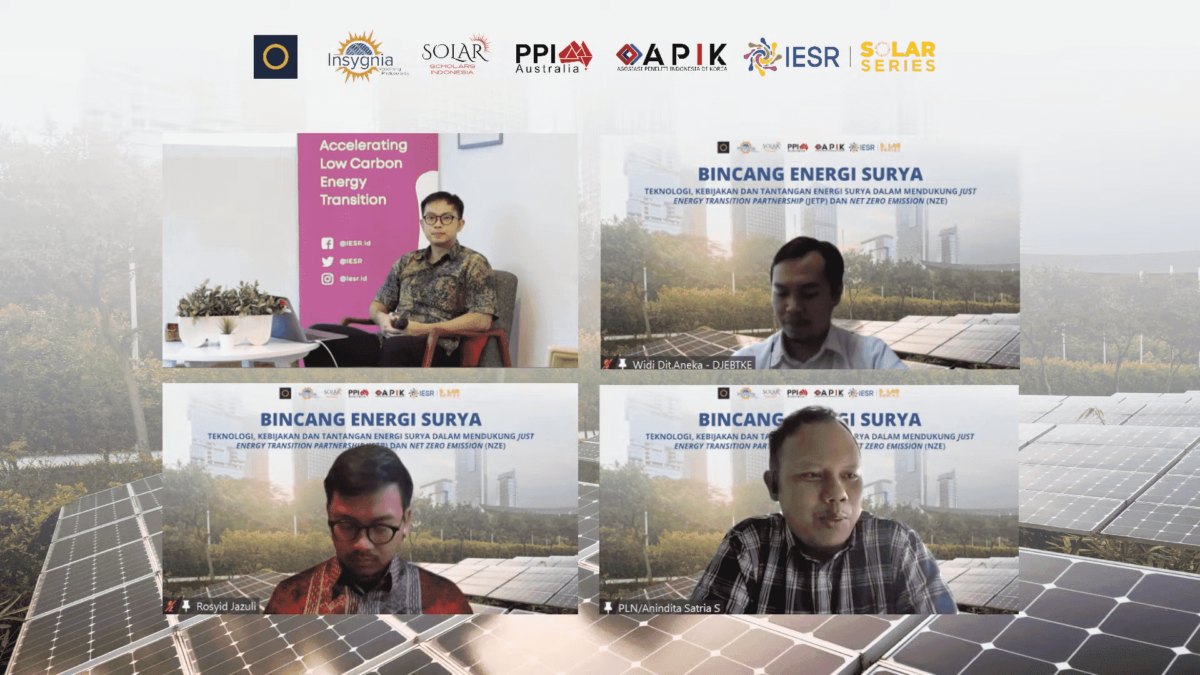Jakarta, 9 March 2023 – Solar energy has the potential to be developed massively in Indonesia. The Institute for Essential Services Reform in its report entitled “Beyond 207GW” states that the technical potential of solar energy in Indonesia reaches 20,000 GW. Unfortunately, the use of solar energy is still minimal. It is noted that the installed capacity of new solar energy is around 270.3 MW until 2022.
In the talk show “Bincang Energi Surya”, the collaboration of six institutions namely the Institute for Essential Services Reform (IESR), Solar Scholars Indonesia (SSI), the Indonesian Student Association (PPI) Australia, the Korean Indonesian Research Association (APIK), the New Generation Solar Energy Institute (Insygnia) ), and Solarin, Anindita Satria Surya, Vice President of Energy Transition and Climate Change of PT PLN stated that the development of solar energy is very necessary for the development of renewable energy.
“The description of the JETP scenario is first, building a large baseload such as hydropower, second, building a strong transmission network, and third, building supporting plants such as PLTS,” he explained, explaining the big picture of PLN’s plans to build renewable energy generators in the next few years.
In addition to a comprehensive investment plan for implementing the Just Energy Transition Partnership program, the development of renewable energy generators is also guided by the RUPTL. In the 2021-2030 RUPTL, it is planned that Indonesia will have more than 50% of the energy used come from renewable energy sources. Solar energy itself is planned to increase by 4.6 GW until 2030.
Widi Nugroho, Sub-Coordinator of Supervision of Various New and Renewable Energy Businesses, Ministry of Energy and Mineral Resources emphasized that to pursue the target of a renewable energy mix of 23% by 2025, fulfillment will be prioritized with solar energy.
“For the development of NRE generators, priority is given according to the 2021-2030 RUPTL where solar will increase by 4.6 GW in 2030,” he explained.
Based on the government’s plan, solar energy will be the main pillar of Indonesia’s electricity system with a capacity of 461 GW in 2060. As Indonesia receives the Just Energy Transition Partnership (JETP) funding, it opens up various funding opportunities for renewable energy projects and technology research.
On the same occasion, Muhamad Rosyid Jazuli, Policy Researcher, Paramadina Public Policy Institute, stated that currently there is one main challenge from the policy side, namely the accumulation of a number of commitments that are not accompanied by derivative regulations so that progress towards achieving the promised commitments does not run smoothly.
“The high dominance of coal in Indonesia’s electricity system and the price of coal which is considered relatively cheaper is one of the challenges in developing renewable energy, especially solar,” explained Rosyid.
Rosyid also added that in addition to policies, public perceptions need to be developed in relation to renewable energy and low-carbon technologies so that behavior changes can occur. At present, renewable energy or other low-carbon technologies, such as electric vehicles or rooftop PV, have not become the people’s first choice. Limited information related to technology and prices that are still relatively expensive are some of the aggravating factors in society.
Bincang Energy Surya is a series of public dissemination events about solar energy. Solar energy thematic dissemination will be held regularly, every two weeks until June 2023, covering topics; Indonesia’s solar energy landscape, current policies, technology, industry, socio-economic and human resource readiness to support the Just Energy Transition Partnership (JETP) and Net Zero Emission (NZE) targets.

